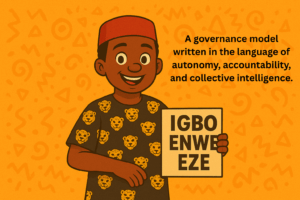In a world chasing shortcuts, the ancient Igbo philosophy of Igba Mbọ (Persistent Endeavour) offers the timeless path to sustainable wealth.
Onye ara bu onye tụrụ nkịtị n’ọgba egwuregwu wee chọta ego.
(A fool is the one who goes to the wrestling arena to look for money, instead of to wrestle.)
This Igbo proverb cuts to the heart of a modern illusion. In an age of viral lotteries, crypto “airdrops,” and get-rich-quick schemes, the ancient wisdom of our ancestors offers a necessary and grounding truth: authentic, lasting wealth is not a prize to be found, but a capacity to be built. It is the product of work, of ịrụ ọrụ, which shapes not just our bank accounts, but our very character.
The Igbo world view, grounded in practicality and self-determination, has little room for the fantasy of unearned riches. Let us explore why the path of work is the only true path to wealth.
The Deceptive Allure of the “Unexpected Gift”
The stranger’s gift is alluring. It promises a bypass—a way to circumvent the sweat, the struggle, and the slow, patient growth that true success demands. In our digital age, this “stranger” can take many forms:
- The anonymous crypto promoter promising 1000x returns.
- The email from a “prince” needing to transfer millions.
- The social media influencer selling a course on “making money while you sleep” with no real work.
These are the modern-day equivalents of the folk tale where a spirit offers a pot of gold. Our ancestors would caution us with the words, “Egbe bere, ugo bere, nke si ibe ya ebena, nku kwaa ya.“ (Let the kite perch, let the eagle perch, whichever denies the other a perch, may its wing break.) This is not just about live-and-let-live; it is about the natural order of exchange. True value is created through a balance of giving and receiving, of effort and reward. An unexpected, unearned gift from a stranger disrupts this balance. It has no roots, and like a plant with no roots, it will wither as quickly as it appeared.
Work as the Forge of Character and Capacity
For the Igbo, work (ọrụ) is far more than a means to an end. It is the very process through which an individual becomes a person of substance, an Nwadiala (a true son/daughter of the soil).
When you build something with your own hands and mind, you gain more than the product:
- You Gain Knowledge (Ima ihe): The farmer who tills the land learns the soil, the weather, and the seeds. The apprentice learning a trade absorbs not just skill, but the discipline and patience of the master. This knowledge is a form of internal wealth that no one can take from you.
- You Build Resilience (Iguzosi ike n’ike): Every challenge overcome in the course of work strengthens your resolve. A business that survives a downturn, a craftsman who perfects a difficult technique—these struggles build the “backbone” required to not only acquire wealth but to hold onto it. “Aka nri kwoo aka ekpe, aka ekpe akwoo aka nri.” (The right hand washes the left, and the left hand washes the right.) Your own efforts, in collaboration and persistence, are what cleanse you of helplessness and build self-reliance.
- You Establish Your Identity and Legacy: In traditional Igbo society, a person was known by their ọrụ—their farm, their trade, their title. Your work is your signature on the world. It is what you are known for and how you contribute to your community. An unexpected gift from a stranger adds nothing to your name; it is anonymous and hollow. The wealth built from work, however, tells a story of diligence, intelligence, and honor.
The Wisdom of “Igba mbọ” (Persistent Endeavor)
The core of this philosophy is igba mbọ—the persistent, relentless pursuit of a goal. It is the energy you pour into your chosen path. This is the engine of real wealth.
Our elders say, “Ebe onye dara, ka o si bilie.” (Where a person falls is where they should get up.) This wisdom is not about avoiding failure; it is about the dignity and growth found in rising from it. The “stranger’s gift” insulates you from failure, and in doing so, it steals from you the most valuable lessons. The wealth that comes from igba mbọ is resilient because it has been tested. It has faced failure and persisted.
The True Meaning of Wealth
In the end, DijịỌma reminds us that the Igbo concept of akụ na ụba (wealth and prosperity) is holistic. It encompasses strong family, good health, respect within the community, and the capacity to create and provide. This kind of wealth cannot be dropped into your lap by a stranger. It is cultivated over a lifetime of meaningful work, responsible action, and community contribution.
Do not be the fool in the wrestling arena, searching for scattered coins while the real prize—the glory, strength, and honor earned through victory in the contest—eludes you. Reject the seductive shortcuts. Embrace the sacred, character-forging path of work.
Your hands, your mind, and your unwavering spirit are the only true sources of wealth you will ever need.
What are your thoughts? How has the principle of work shaped your own journey to prosperity? Share your wisdom in the comments below.


Leave a Reply